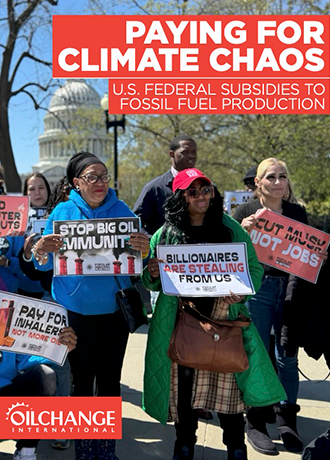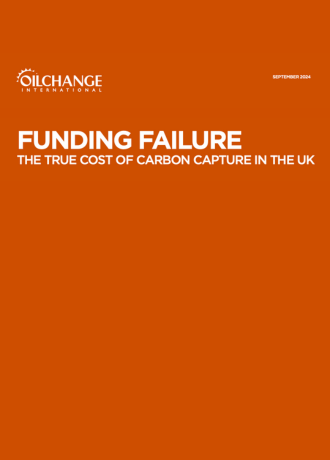
Paying for Climate Chaos: U.S. Federal Subsidies for Fossil Fuel Production
"Paying for Climate Chaos" reveals the staggering scope of federal government subsidies for fossil fuel production.
Oil Change International publishes upwards of 20 reports and briefings every year focused on supporting the movement for a just phase-out of fossil fuels.

"Paying for Climate Chaos" reveals the staggering scope of federal government subsidies for fossil fuel production.

Prime Minister Keir Stamer paints a bleak picture of the economic situation in the UK, announcing worsening economic and social pressures. The thing is, there is money. It is just being spent on the wrong things. The UK has already spent or committed nearly £500 million on CCS projects since 2010. £168 million of this was spent between 2012 and 2016 on two projects (Peterhead and White Rose) that failed to get off the ground. Policies announced since 2020 have made available £25.26 billion for CCS and hydrogen projects. Only a fraction of this has been committed to date. This is enough to fund the total 2023 winter fuel allowance payout 12 times over.

Governments have spent over $20 billion – and have approved up to $200 billion more – of public money on carbon capture and storage (CCS), providing a lifeline for the fossil fuel industry. Almost 80% of operating carbon capture capacity globally sends captured CO2 to produce more oil via Enhanced Oil Recovery, while many of the world's largest CCS projects overpromise and underdeliver.

The Glasgow Statement on public finance requires signatories to end new direct overseas support for fossil fuels by the end of 2022 and fully prioritize finance for a clean and just energy transition. But only a handful of signatories have begun to turn these pledges into action.

This briefing explains why financial flows to fossil fuels matter and how to use the data provided by the Public Finance for Energy Database to help secure a just energy transition.

The new report finds that wealthy nations — the United States, United Kingdom, Canada, Norway, and Australia — planning to approve and subsidize new fossil fuel projects which undermines their recent claims of leadership in addressing the climate crisis.

Our new report “Past Last Call: G20 public finance institutions are still bankrolling fossil fuels” looks at G20 country and MDB public finance for fossil fuels from 2018-2020 for the first time and finds they are still backing at least USD 63 billion per year in oil, gas, and coal projects.

One day before world leaders meet to discuss the energy transition at the United Nations High Level Dialogue on Energy, more than 200 civil society organizations (CSOs) from over 40 countries have released a statement calling on world leaders to end international public finance for coal, oil and gas.

Over 500 groups released an open letter being sent to U.S. House Speaker Nancy Pelosi and Senate Majority Leader Chuck Schumer, urging them to end fossil fuel subsidies.

In this new report we consider recovery commitments and pre-pandemic policies to rank G20 countries' progress in phasing out support to fossil fuels. We find at least USD 584 billion per year between 2017 and 2019 in public support for fossil fuels from G20 governments.